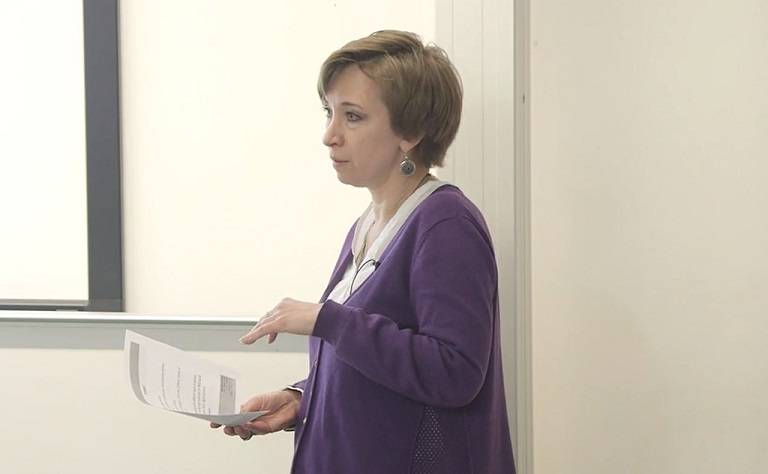Shrinking Space for Civil Society in Russia: Challenges and New Strategies
23 June 2017
Jacob Goodison Burgess (MSc Global Governance and Ethics) on the GGI keynote lecture with Natalia Taubina, Director of the Public Verdict Foundation.

Since 2012, government legislation in Russia has imposed serious challenges for the daily operation of non-governmental organisations (NGOs). This legislation is illustrative of a wider crackdown against civil society and a deterioration of human rights conditions throughout the country. Director of the Public Verdict Foundation, Natalia Taubina, has 25 years' experience working in the human rights field, and in discussion with the Global Governance Institute she explains how this crackdown has been implemented, and how Russian and global civil society should respond. Although no definition of civil society is provided, this talk provides useful insight into the ways that the not-for-profit sector has come under assault in Russia.
Taubina begins by outlining the origin of the new anti-civil society legislation in Russia, which can be traced back to the controversial third inauguration of President Putin in 2012. Since this time, there has been a wave of public protests in Russia, as many have been demanding greater dignity and justice in the face of rampant corruption. The Foreign Agents Law, passed in 2012 amidst this growing dissatisfaction, states that any organisation that receives funds from abroad and is engaged in 'political activity', must be included in a registry of foreign actors. As the definition of 'political activity' in Russia includes almost any form of public activity, this legislation imposes serious restrictions on freedom of assembly, and stigmatises a wide array of NGOs as being puppets of foreign opponents.
The Public Verdict Foundation is one of 160 NGOs that have been registered as foreign agents in Russia, and inclusion in this registry imposes several constraints that organisations must observe or face serious punishment. For instance, NGOs must provide quarterly reports to the government on both their organisational expenses and the number of employees working in their offices, and any publication must include a full explanation outlining the organisation's status as a foreign agent. Taubina argues that while it is important to maintain a degree of transparency, these new regulations impose restrictions that many organisations cannot hope to comply with. Since this legislation has been enacted, more than 130 administrative cases have been brought against civil society organisations, often ending in either financial punishment or up to two years in jail for the leaders of these organisations. These legislative changes are intended to alienate both domestic and international support for foreign funded NGOs. As a result, a number of NGOs have dissolved and physical attacks against employees and offices of 'foreign agents' have become more frequent, with the authorities showing little enthusiasm for investigating or preventing these attacks. Although the Public Verdict Foundation used to provide training for public prosecutors, they are no longer able to do so as employees of the state have increasingly turned their back on organisations that have been included in the foreign agents registry. Due to the financial and social costs of being labelled a foreign agent, many NGOs have stopped accepting support from abroad. Domestic sources of funding in Russia are scarce, and Taubina states that there is a clear reluctance amongst the Russian elite to provide the financial support that is so vital to the operation of NGOs and civil society more generally.
To respond to these conditions, Taubina outlines several strategies that have been implemented by civil society in Russia. For example, a number of NGOs have employed different organisational models to continue their work, and some have even decided to register as commercial entities to avoid the restrictions of the Foreign Agents Law. Additionally, a number of non-registered grass roots movements have sprung up throughout Russia, and the growing use of social media and crowd funding as organisational tools may provide new and innovative ways of delivering and funding activities. Taubina also stresses the need for NGOs in Russia to form national coalitions and establish solidarity in the face of heightening adversity.
While these strategies may prove useful in combatting the increasingly hostile environment in Russia, Taubina does not necessarily acknowledge the broader geopolitical drivers of this phenomenon. Russian restrictions on civil society seem to represent a response to the growing fear of Western intervention in domestic Russian politics, and a similar hysteria is currently (perhaps justifiably) gripping the US. It is important to note that the crackdown on civil society is not just occurring in Russia, and the Russian Foreign Agents Law is frequently justified on the basis that the US has a similar Foreign Agents Registration Act. Therefore, the new anti-civil society legislation in Russia does not solely reflect the increased tensions between the US and Russia but also reveals some of the cracks that are emerging in the liberal tradition that civil society can be seen to embody. If this is the case then there is no easy or immediate solution to the problems faced by civil society in Russia. While devising new strategies for NGOs on the ground is important, the international community should make a broader effort to strengthen the liberal order that preserves and protects our human rights. Taubina postulates that one possible remedy is to establish a United Nations declaration that would provide legal protections for civil society around the world. However such a declaration would require a great deal of consensus within the international community, and at the time of writing, such agreement seems to be a distant prospect.
 Close
Close


